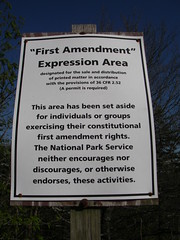Disclaimer: I am not a lawyer. I am a law student. In accordance with ABA policy, this blog should not be viewed as legal advice. It is simply my experiences, opinions, and stuff I looked up on the internet.

- Image by NomadicEntrepreneur via Flickr
Thanks to the First Amendment, we have the right of free speech in the United States. There are limits on free speech  regarding the time, place, and manner of the speech which is why we can’t shout “Fire!†in a crowded theatre. The First Amendment also doesn’t protect obscenity or libel.
Speech on the internet is generally protected, including anonymous speech. I don’t understand why people want to speak anonymously in this public forum, but the law protects it.
Americans are very quick to sue people they don’t like, so the real question is, can I be sued and lose because of my blog? A quick search on the database and Google has revealed that bloggers have been successfully sued for their blogs.
Defamation and Libel
Based on case law I read, a blogger can be sued for defamation and libel if they use their blog to make false statements about a public figure. The courts seem to apply a broad definition to “public figure.†If the public figure the blogger talks about in their blog can show that the blogger made a false statement about them and that the statement was made with “actual malice,†then they have a valid claim for defamation and libel.
Conversely, a blogger’s personal opinion is protected by the First Amendment. It’s only when they are making statements of fact or a combination of fact and opinion that they have to be concerned that they could be sued if they are publishing false statements.
Copyright Infringement
A person gets a copyright if they create an original work of authorship that is fixed in a tangible medium. They don’t have to register their work in any database; they just have to create it. Therefore, bloggers should own the copyright for all their posts, unless they previously gave up their copyright rights to someone else. If a blogger posts someone else’s material and claims it as their own, that’s copyright infringement. Writing about the same ideas is ok; stealing someone’s verbiage is not.
I don’t know why anyone would do this – isn’t the purpose of having a blog to express your own views and ideas? I suspect few bloggers are policing the internet looking for people infringing on their work and most aren’t equipped with the resources to file a claim against another blogger for stealing their work. I’m fine with people stealing my verbiage for their blog as long as they include a link back to this site. My guess is most bloggers are equally fine with others quoting them as long as they get the attribution.
You Can Be Sued for Your Comments – Not Sure If You Can Lose
Aaron Wall was sued by Traffic-Power.com when negative comments about the company appeared on Wall’s website, SEOBook.com. Wall opted to remove the comments about Traffic Power instead of spending his time, energy, and money to fight the lawsuit.
I don’t know what the comments about Traffic Power said, but it makes me wonder if other companies will threaten lawsuits against bloggers to remove negative comments about themselves online. Most bloggers probably won’t want to go through the time and hassle of fighting the suit, even when the comments might be protected by the First Amendment. Even if there wasn’t a valid case in this situation, it should serve as a reminder that bloggers are responsible for the comments they allow to be posted on their sites.
Related articles by Zemanta
- Louisiana Politician Drops Defamation Suit (mediadecoder.blogs.nytimes.com)
- U.S. judge sides with anonymous online flamers (sfgate.com)
![Reblog this post [with Zemanta]](http://img.zemanta.com/reblog_e.png?x-id=38c6d8a4-be05-4572-ab01-51474b99805d)